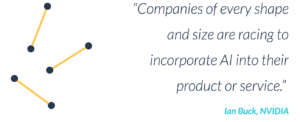WSJ put a new, interactive report this week on artificial intelligence and its existing applications – as well as its history and where it may go in the future.
 “AI” in limited fashion goes back in history around sixty years, but it’s only started to accelerate recently, and it’s expected that AI-related technologies will drive close to $60 billion in revenue by 2025. Why has it taken off now? A couple of reasons: all the “big data”-driven work in recent years has given AI massive datasets to be trained on, GPUs that evolved to fuel our video games have found alternate use in machine learning and cloud-based services like AWS have made it easier for interested researchers, including those playing at home, to have access to the computing power needed to help their algorithms get smart. Oh, and the wide variety of open-source tools provided by juggernauts like Google and Facebook haven’t hurt matters either. In short, it’s been fueled by data and democratized by the largest companies out there.
“AI” in limited fashion goes back in history around sixty years, but it’s only started to accelerate recently, and it’s expected that AI-related technologies will drive close to $60 billion in revenue by 2025. Why has it taken off now? A couple of reasons: all the “big data”-driven work in recent years has given AI massive datasets to be trained on, GPUs that evolved to fuel our video games have found alternate use in machine learning and cloud-based services like AWS have made it easier for interested researchers, including those playing at home, to have access to the computing power needed to help their algorithms get smart. Oh, and the wide variety of open-source tools provided by juggernauts like Google and Facebook haven’t hurt matters either. In short, it’s been fueled by data and democratized by the largest companies out there.
Existing applications already range from novelties (e.g., training an algorithm to differentiate between a dog and a muffin, and if you want to sound sophisticated when you talk about that, call it “adversarial images for deep learning”) to life-saving use cases (the market for AI-related health care applications may reach as much as $10 billion by 2024, and yes, it would be quite possible that they fuse a couple of the use cases in the article so that the technology that reads medical imaging can say “It’s not a tumor” in Arnold Schwarzenegger’s voice).
But, as interesting as some existing applications might be, there is a lot more potential when you look further afield. Think about it using the lens of your business. We regularly assist our clients in thinking of new ways that they can leverage their data with algorithmic tools that learn from their existing databases, customer interactions and publicly available data to deliver unique, valuable services, optimize processes and make engagements more relevant. What data do you currently collect? It’s probably a lot, and you’re probably not getting nearly as much out of it as you could.